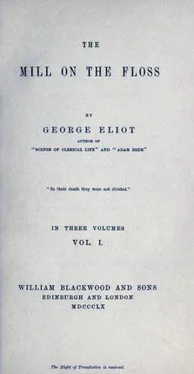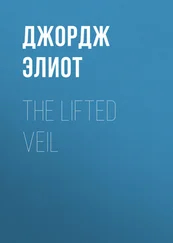"Maggie, Maggie!" exclaimed Mrs. Tulliver, sitting stout and helpless with the brushes on her lap, "what is to become of you if you're so naughty? I'll tell your aunt Glegg and your aunt Pullet when they come next week, and they'll never love you any more. Oh dear, oh dear! look at your clean pinafore, wet from top to bottom. Folks 'ull think it's a judgment on me as I've got such a child, — they'll think I've done summat wicked."
Before this remonstrance was finished, Maggie was already out of hearing, making her way toward the great attic that run under the old high-pitched roof, shaking the water from her black locks as she ran, like a Skye terrier escaped from his bath. This attic was Maggie's favorite retreat on a wet day, when the weather was not too cold; here she fretted out all her ill humors, and talked aloud to the worm-eaten floors and the worm-eaten shelves, and the dark rafters festooned with cobwebs; and here she kept a Fetish which she punished for all her misfortunes. This was the trunk of a large wooden doll, which once stared with the roundest of eyes above the reddest of cheeks; but was now entirely defaced by a long career of vicarious suffering. Three nails driven into the head commemorated as many crises in Maggie's nine years of earthly struggle; that luxury of vengeance having been suggested to her by the picture of Jael destroying Sisera in the old Bible. The last nail had been driven in with a fiercer stroke than usual, for the Fetish on that occasion represented aunt Glegg. But immediately afterward Maggie had reflected that if she drove many nails in she would not be so well able to fancy that the head was hurt when she knocked it against the wall, nor to comfort it, and make believe to poultice it, when her fury was abated; for even aunt Glegg would be pitiable when she had been hurt very much, and thoroughly humiliated, so as to beg her niece's pardon. Since then she had driven no more nails in, but had soothed herself by alternately grinding and beating the wooden head against the rough brick of the great chimneys that made two square pillars supporting the roof. That was what she did this morning on reaching the attic, sobbing all the while with a passion that expelled every other form of consciousness, — even the memory of the grievance that had caused it. As at last the sobs were getting quieter, and the grinding less fierce, a sudden beam of sunshine, falling through the wire lattice across the worm-eaten shelves, made her throw away the Fetish and run to the window. The sun was really breaking out; the sound of the mill seemed cheerful again; the granary doors were open; and there was Yap, the queer white-and-brown terrier, with one ear turned back, trotting about and sniffing vaguely, as if he were in search of a companion. It was irresistible. Maggie tossed her hair back and ran downstairs, seized her bonnet without putting it on, peeped, and then dashed along the passage lest she should encounter her mother, and was quickly out in the yard, whirling round like a Pythoness, and singing as she whirled, "Yap, Yap, Tom's coming home!" while Yap danced and barked round her, as much as to say, if there was any noise wanted he was the dog for it.
"Hegh, hegh, Miss! you'll make yourself giddy, an' tumble down i' the dirt," said Luke, the head miller, a tall, broad-shouldered man of forty, black-eyed and black-haired, subdued by a general mealiness, like an auricula.
Maggie paused in her whirling and said, staggering a little, "Oh no, it doesn't make me giddy, Luke; may I go into the mill with you?"
Maggie loved to linger in the great spaces of the mill, and often came out with her black hair powdered to a soft whiteness that made her dark eyes flash out with new fire. The resolute din, the unresting motion of the great stones, giving her a dim, delicious awe as at the presence of an uncontrollable force; the meal forever pouring, pouring; the fine white powder softening all surfaces, and making the very spidernets look like a faery lace-work; the sweet, pure scent of the meal, — all helped to make Maggie feel that the mill was a little world apart from her outside every-day life. The spiders were especially a subject of speculation with her. She wondered if they had any relatives outside the mill, for in that case there must be a painful difficulty in their family intercourse, — a fat and floury spider, accustomed to take his fly well dusted with meal, must suffer a little at a cousin's table where the fly was au naturel , and the lady spiders must be mutually shocked at each other's appearance. But the part of the mill she liked best was the topmost story, — the corn-hutch, where there were the great heaps of grain, which she could sit on and slide down continually. She was in the habit of taking this recreation as she conversed with Luke, to whom she was very communicative, wishing him to think well of her understanding, as her father did.
Perhaps she felt it necessary to recover her position with him on the present occasion for, as she sat sliding on the heap of grain near which he was busying himself, she said, at that shrill pitch which was requisite in mill-society,–
"I think you never read any book but the Bible, did you, Luke?"
"Nay, Miss, an' not much o' that," said Luke, with great frankness. "I'm no reader, I aren't."
"But if I lent you one of my books, Luke? I've not got any very pretty books that would be easy for you to read; but there's 'Pug's Tour of Europe,'—that would tell you all about the different sorts of people in the world, and if you didn't understand the reading, the pictures would help you; they show the looks and ways of the people, and what they do. There are the Dutchmen, very fat, and smoking, you know, and one sitting on a barrel."
"Nay, Miss, I'n no opinion o' Dutchmen. There ben't much good i' knowin' about them ."
"But they're our fellow-creatures, Luke; we ought to know about our fellow-creatures."
"Not much o' fellow-creaturs, I think, Miss; all I know — my old master, as war a knowin' man, used to say, says he, 'If e'er I sow my wheat wi'out brinin', I'm a Dutchman,' says he; an' that war as much as to say as a Dutchman war a fool, or next door. Nay, nay, I aren't goin' to bother mysen about Dutchmen. There's fools enoo, an' rogues enoo, wi'out lookin' i' books for 'em."
"Oh, well," said Maggie, rather foiled by Luke's unexpectedly decided views about Dutchmen, "perhaps you would like 'Animated Nature' better; that's not Dutchmen, you know, but elephants and kangaroos, and the civet-cat, and the sunfish, and a bird sitting on its tail, — I forget its name. There are countries full of those creatures, instead of horses and cows, you know. Shouldn't you like to know about them, Luke?"
"Nay, Miss, I'n got to keep count o' the flour an' corn; I can't do wi' knowin' so many things besides my work. That's what brings folks to the gallows, — knowin' everything but what they'n got to get their bread by. An' they're mostly lies, I think, what's printed i' the books: them printed sheets are, anyhow, as the men cry i' the streets."
"Why, you're like my brother Tom, Luke," said Maggie, wishing to turn the conversation agreeably; "Tom's not fond of reading. I love Tom so dearly, Luke, — better than anybody else in the world. When he grows up I shall keep his house, and we shall always live together. I can tell him everything he doesn't know. But I think Tom's clever, for all he doesn't like books; he makes beautiful whipcord and rabbit-pens."
"Ah," said Luke, "but he'll be fine an' vexed, as the rabbits are all dead."
"Dead!" screamed Maggie, jumping up from her sliding seat on the corn. "Oh dear, Luke! What! the lop-eared one, and the spotted doe that Tom spent all his money to buy?"
"As dead as moles," said Luke, fetching his comparison from the unmistakable corpses nailed to the stable wall.
Читать дальше












